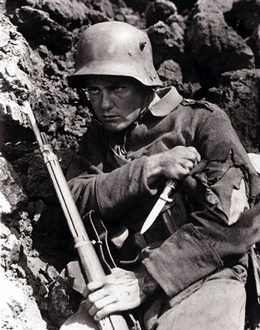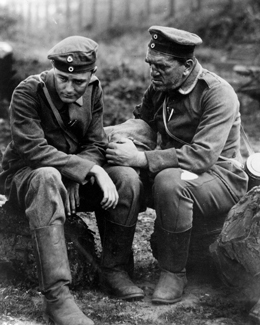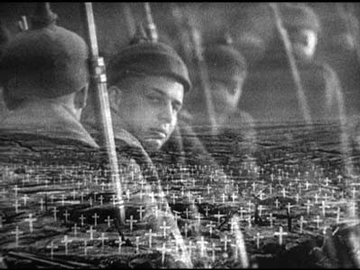
 |
|
|
|
Serious pacifism has borne a long history of social resentment. Surely the issue goes back to the beginning of the Republic, but in the 20th century individuals that protested wars or evaded serving were considered disloyal at best and traitors more often than you'd think. Some intellectuals opposing WW1 were clobbered by the anti-Communist purge of the early 1920s. Isolationist industries courting the markets of Axis countries advocated neutraility in the late 1930s, but Pearl Harbor initiated a new unofficial social campaign against those lousy defeatists and ingrates. Freedom isn't free! 
Interestingly enough, the most popular pacifist author between the World Wars was a German, Erich Maria Remarque. His book All Quiet on the Western Front opened the eyes of readers all over the world, and dramatized the human cost of the petty conflict between a handful of Western monarchies that "slew half the seed of Europe". In 1930 Universal executive Carl Laemmle was still in the market for one or two prestige pictures a year, and All Quiet on the Western Front was his pick for 1930. It was shot and released in two versions: an all-talkie and a silent version for theaters not yet equipped for audio. Although All Quiet has always been around, the quality of the prints available has always been atrocious. Later edited versions simply massacred the film from its original continuity. Anti-pacificist censors couldn't have done a better job of mangling this great movie, an Oscar-winner for Best Picture. Universal's new Blu-ray is a breathtaking beauty. It's an old line, but if you haven't seen this new restoration, then you really haven't seen All Quiet. The lavishly produced spectacle afforded director Lewis Milestone an opportunity at a world-class filmmaking assignment, which he carried off in style. The story partly follows the experiences of author Remarque, who was stationed on the Western front in WW1 Germany until he was hit by shrapnel in the leg and sent back to hospital. Paul (a young Lew Ayres) and his high school chums are inspired to enlist early by a jingoistic teacher. Several of the boys have daydreams of glory and heroism. After suffering through training at the hands of a sadistic Captain, they find themselves in the trenches with a million other miserable soldiers. Living conditions are horrific and orders to advance result in terrible casualties. Much of the time is spent waiting to be hit by a cannon shell; a deafening barrage can last for days. Paul finally is wounded, and goes through another terrible experience in the hospital. Returning home, he cannot explain his new feelings to his sister and mother (Beryl Mercer), but he does protest when his old schoolteacher insists on calling him a noble hero, to encourage yet more boys to enlist. Paul is almost eager to get back to the front, where he has real friends like Kat (Louis Wolheim) and Tjaden (Slim Summerville). They're now veterans in a war that may continue forever. There had been epic war pictures before, notably King Vidor's 1925 The Big Parade. Milestone's All Quiet won the approval of a million Americans that had experienced the horrors of the war. It was considered a brave movie from the first. Then again, the misery, lack of morale and frequent feelings of mutiny are more easily ascribed to our former enemies. If you want to keep the censors and militarists from banning your film about terrible conditions for soldiers, set your story in some other country's army. 
Just the same, the universality of author Remarque's message came across loud and clear. Paul's fellows hold no animosity toward the French soldiers opposing them in the trenches, and reserve their hatred for the Captain that made certain that they missed all their opportunities for leave back in training camp. For once audiences could imagine what it really might be like to live in cold mud, unable to stick one's head up for fear of being shot by a sniper. Milestone's superb combat scene emphasizes the battlefield as a factory of death. Moving cameras continue as soldiers fall and are left behind, 'ground up' in the mechanized slaughter. Milestone's most famous shot is a fast truck down a line of barbed wire as German soldiers charge forward, only to be cut down like wheat in a harvest -- the camera has taken the POV of the machine gun. After an advance that seemingly costs 40% casualties, a voice calls out that the first wave no longer has sufficient men to hold their new positions. The troops must fall back as the enemy counterattacks. When the smoke clears, the battle lines are the same as ever, except that hundreds of men have been killed. And so it goes. Milestone and his cameraman Arthur Edeson set up many beautifully expressive shots, like the classroom that fronts on a military parade, and the famous image of a soldier shown being blown up, so that only his hands still remain clutching the barbed wire. Because the film's visual style doesn't abandon the visual techniques of silent cinema, it seems far more modern than many Hollywood productions from 1930. The credited screenplay writer is the multi-talented George Abbott, who later had big successes on stage and film with Damn Yankees! and The Pajama Game. All Quiet's continued appeal comes from watching Paul and his pals attempting to adjust to their situation. The boys that survive are definitely altered, in psychological terms. Old-timer Kat is a great teacher for life in the trenches. Tjaden plucks lice from his uniform and throws them in the fire. The boys get only one major break, when they're invited to share the beds of some French girls. We're relieved; Paul has gone straight from his schoolbooks to the trenches. The dialogue is never lame or preachy, but it can get overly emotional. Paul laments out loud that he doesn't understand why he has to kill, why the entire world seems organized to such a perverse end. His deliriously joyful outburst in the hospital when he discovers he's still alive may seem overplayed, yet is completely honest. The biggest blow comes when Paul confronts the teacher who exhorted his pupils to "do their duty" for the fatherland. Paul tells the younger students not to be fooled by such lies but we can see that some of them consider him a coward. The scene will ring true to men of a certain age who found their high school assemblies attended by service recruiters inspiring us to do our duty in Vietnam. Lew Ayers was so impressed by the theme of All Quiet on the Western Front that he became a pacifist. He experienced career trouble ten years later when he refused combat duty as a soldier. He instead became a combat medic, taking the same battlefield risks but refusing to kill. Louis Wolheim has a supremely homely face that soon becomes lovable. The friendship between sergeant and recruit is the strongest bond in the story. 
Every movie about war calls itself an anti-War movie, which seems disengenuous when we males attend to enjoy the spectacular scenes of killing and destruction. All Quiet on the Western Front haunted the conscience of the world, and we only wish that it had an effect on our politics as well as our hearts. Right-wing groups associated its message with defeatism, and Fascists proclaimed it communist propaganda intended to weaken military resolve. It was of course banned in Nazi Germany. Universal's 100th Anniversary Collector's Edition Blu-ray of All Quiet on the Western Front will be a revelation to fans of this great picture. Not only is it much longer (some cut-down versions lopped 40 minutes from its running time), the image and audio have been restored to a like-new level of quality. I remember attending a 1976 screening of All Quiet with Robert S. Birchard. The best print the Academy could find was a muddy, chopped-up mess that cut rudely to the final image, adding some kind of discordant music. The new restoration has clearly located an intact, prime-quality printing element. The picture barely seems to have a mark on it, and the audio sounds very good. We really made a mistake when we judged the quality of early-talkie audio from bad dupe prints and optical dub-downs. This is one title that I never thought I'd see looking this good. To emphasize the improvement in sound, in the famous ending we can how hear that director Milestone drops out the soundtrack entirely at the conclusion of the famous Butterfly Incident. On the old prints laden with hiss and static, we'd never have noticed this detail. All Quiet on the Western Front has almost no composed soundtrack; the music we hear is all sourced from within the story. The book-style folding Collector's package contains a Blu-ray disc, a second copy on DVD and a digital download. A 48-page souvenir book yields colorful original items and correspondence, not merely photos and publicity copy. The big extra is the original Silent Version of the film, which looks just as good. It's an entirely different shoot and some people say that it works better, but I like the voices of Ayres, Wolheim and Summerville, and Lewis Milestone's ear-battering combat sound effects. Some promotional pieces celebrating Universal's 100th Anniversary are present as well. The mono track is available only in English, but English, Spanish and French subs are optional.
On a scale of Excellent, Good, Fair, and Poor,
All Quiet on the Western Front Blu-ray rates:
Reviews on the Savant main site have additional credits information and are often updated and annotated with reader input and graphics. Also, don't forget the 2011 Savant Wish List. T'was Ever Thus.
Review Staff | About DVD Talk | Newsletter Subscribe | Join DVD Talk Forum |
| ||||||||||||||||||